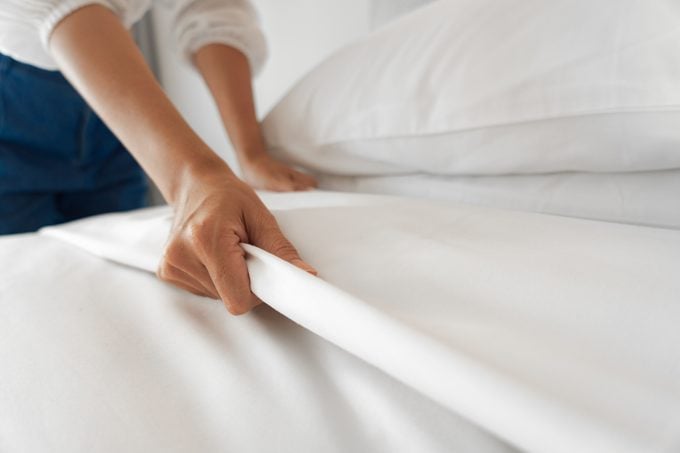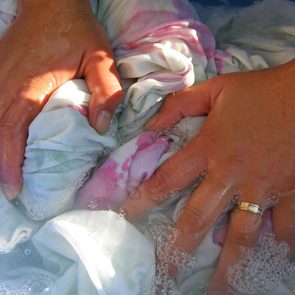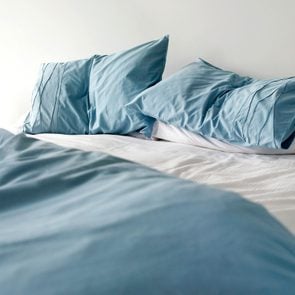How Often Should You Wash Your Sheets? Here’s What Germ Experts Recommend
Updated: Jun. 06, 2024
Your sheets accumulate sweat, dirt, dust, and more. How often your dirty sheets need cleaning depends on your skin, your habits...and possibly, your pets.
The importance of changing your sheets
Despite being someone who loves to cuddle with dogs, I’m super picky about the cleanliness of my bed. One day, a friend of mine came to pick me up for a movie and he sat on the edge of my bed while I got ready. “Don’t sit on my bed!” I squealed at him, “You’re wearing street clothes.”
“You let your eighty pound dog—who goes into the street and also on trails, where he rolls around in stuff—sleep under the covers with you,” he laughed. “But I can’t sit on the comforter in street clothes?” As it turns out, I wasn’t wrong—at least not about the street clothes—but, during the time my dog slept with me every night, I probably should’ve been washing my sheets more frequently.
Timing is everything, especially when it comes to cleaning, germs, and your health. Think about it: you need to regularly replace your toothbrush and loofah sponge. There’s only so long you can go before it’s time to wash your hair. It’s equally as important to know how often you should wash your sheets.
We spoke with a dermatologist and a germ experts to get to the bottom of this question, and explain what happens if you don’t. Plus, we fill you in on who needs to wash their sheets more often than others, what sheets are easiest to care for, and how to wash them properly.
20 little things everyone forgets to clean
How often should you wash your sheets—and why?
Admittedly, stripping a bed, washing sheets, and then redressing it is a chore. But seeing as you spend lots of time in bed each week, you want to make sure you’re slipping between clean sheets. “I always make a point to wash my sheets once a week, mostly because one of the simple pleasures in life is sliding between crisp, clean sheets,” says Carol Mehas, founder of arbOUR natural cleaning products and a lifelong seeker of a “better way” to clean. “You spend one-third of your life in bed! So invest in the idea that nightly rest is the time when your body recovers and heals.”
The National Sleep Foundation backs this up. The average adult needs seven to nine hours of sleep every night, which adds up to around 49 to 60 hours in bed weekly—more time than we spend just about anywhere else.
The Sleep Foundation recommends washing your sheets once per week if you sleep in your bed every night. “If you have pets, and particularly if you let them sleep in your bed, a wash every three to four days is recommended,” the Sleep Foundation suggests. “If you experience allergies or asthma, it may be worth it to try cleaning your bedding more frequently to see if your symptoms improve.”
Even if you don’t let your pets sleep in bed with you, their fur and dander get on you and then into your bed. Keeping your bed as a bit of a sanctuary is good for both your sleep hygiene and your overall health. There are a lot of good reasons to sleep with your dog, but keep in mind that it means changing your sheets more often.
Philip Tierno, PhD, a germ expert and professor of pathology at NYU Grossman School of Medicine, agrees weekly sheet-washing is a good idea. That said, he notes that it depends on whether or not you have a mattress cover. “You have to realize there is a difference between washing sheets that are covering a mattress and washing sheets that cover a mattress cover,” Tierno says. “So when you put a fitted sheet over a mattress without a barrier, you still have the ability of those fibers and particles and odorous material coming through that fitted sheet.”
Over time, mattresses accumulate debris like human skin cells, dust, dust mites, sweat, and even animal hair and pet dander. They also collect residue and oils from lotions, and food particles if you eat in bed.
That’s why Tierno highly recommends mattress protectors. In fact, his top piece of advice is to invest in mattress and pillow covers. “Every single mattress and pillow that is in my home [have] mattress and pillow protectors,” he says.
There is a lot of material that can find its way between your covers and sheets, so remember how important it is to protect yourself from (and avoid adding to) what accumulates in your mattress.
Allergy Symptoms Hijacking Your Day? 10 Things to Try
Who should wash their sheets more often?
As we now know, debris gets on our sheets both from the mattresses themselves and from our bodies, though if we’re using mattress protectors most of it comes off us and whatever we bring into bed with us like food, drinks and pets. But these particals aren’t just problematic in our beds— they also get into the air we breathe.
Dirty sheets can not only irritate sensitive skin, but they may also make asthma and allergies worse. If your respiratory system is sensitive, you may want to consider washing your sheets more than once per week. Sleeping on the best sheets for sensitive skin helps, but you still have to keep them clean.
You may think you can get away with washing your sheets less often if you shower before bed, but that’s not exactly true. “Even shower gels and hair products can leave residue that will transfer onto your sheets, thus harboring bacteria,” Mehas points out.
Some people are just hot sleepers. This can occur for a variety of reasons, such as high metabolism or menopause. Regardless of the reason, Mehas recommends washing sheets more than once a week if you or someone you sleep with sweats a lot. “Invest in three sets of sheets,” Mehas says: “One to change out, one to have on hand and one in the wash pile!”
“If you have three sets of sheets, you always have a clean set at the ready,” Mehas says. One more reason? “If you are naked for more fun reasons, like rolling around with your significant other, it’s a good idea to keep things fresh and stain free.”
The Essential Guide to Deeper Sleep

What happens if you don’t wash your sheets?
You know you need to wash your sheets, but you have better things to do. Like sleep.
Here’s what can happen if you don’t regularly change your sheets.
Skin health
Not washing your sheets may cause contact dermatitis (a red, itchy rash), trigger eczema, and exacerbate any acne that may be present. In addition, the friction from dirty sheets rubbing against your skin can lead to skin irritation. Rashes or infections, such as tinea versicolor—a common fungal infection that causes discolored patches of skin—can also transfer to your skin from dirty sheets.
“People with sensitive skin should change their sheets two times a week to give a helping hand to the skin cells that come in contact with bedding,” Mehas says. “Your [skin cells and other cells] work 24/7 to rid the body of toxins that cause flareups. If your entire cellular system is working overtime, chances are you’re not going to get the optimal sleep you desire.”
Tierno notes that a lot of material can find its way in between those sheets and contribute to odor. Another scenario to consider: imagine sleeping in someone else’s sheets that aren’t clean. There are lots of reasons to be a considerate guest—one who doesn’t show up early or unannounced, for example—and this is another good reason: your health. “Let’s say you’re sleeping with somebody who has a [staph] strain that your body is not accustomed to,” Tierno says. “If you have a [cut], sometimes even without, you could develop an infection.”
Infection is possible because you’re in an environment riddled with cells and microorganisms.
Breathing
In addition to odor, the accumulation of particles could challenge your respiratory system with particles that you’re inhaling, according to Tierno.
You spend about eight hours—or one-third of your life—inhaling whatever debris is in your mattress, pillows, and sheets, Tierno says. If you don’t wash them, you’re inhaling several weeks or months’ worth of accumulation.
And even if you don’t have allergies or asthma, constantly challenging your immune system over time may cause you to develop them, Tierno points out. You can get allergic reactions by constantly inhaling dust particles that contain those materials.
“In reality, it’s not that you may get an infection with these organisms, but they may exacerbate allergies and asthma if you have preexisting asthma,” Tierno says. “Or over time, you may develop asthma or an allergic reaction if you constantly breathe in large quantities of these particles.”
10 Things in Your House That Could Be Making You Sick
Advice for washing your sheets
If you don’t want to wash your sheets every week, you could do what Joseph Marini, house & home blogger at At Home with Joseph, suggests: just wash the pillowcases! Even though washing your sheets weekly at minimum is ideal, one of the holdups is the time it takes. Freshening up the pillowcases is a lower-lift way to manage the hygiene of your sleep space.
Sheets should be washed with the hottest water they can handle. “Hot water is not always the best treatment for more delicate bedding materials,” Mehas points out. “Think of these nice linens and washable silks as a piece of clothing and treat it as such with your machine cycles.”
In addition, Marini also suggests adding a cup of white vinegar directly into the water of your washer to increase the killing off of unwanted bacteria. “Lysol Laundry Sanitizer is a great product to add to the wash,” he says, “especially if your four-legged friend sleeps with your regularly.”
Marini also recommends avoiding the use of oil-based products that scent your laundry, like dryer sheets and fabric softeners that leave residue on sheets. The residue builds up over time and decreases the fabric’s breathability and absorbency, neither of which are good factors for keeping your bed clean.
Sometimes the best solution isn’t something high-tech, but something old-fashioned, natural and 100% free. “If you can hang your sheets on a clothesline, I recommend doing it,” Marini says. “UV from the sun can help eliminate even more bacteria. For those with skin and respiratory allergies, try hanging your sheets in the sun for 30 minutes before you wash them. It gives that additional microbial protection without the risk of pollen getting on your clean sheets.”




















